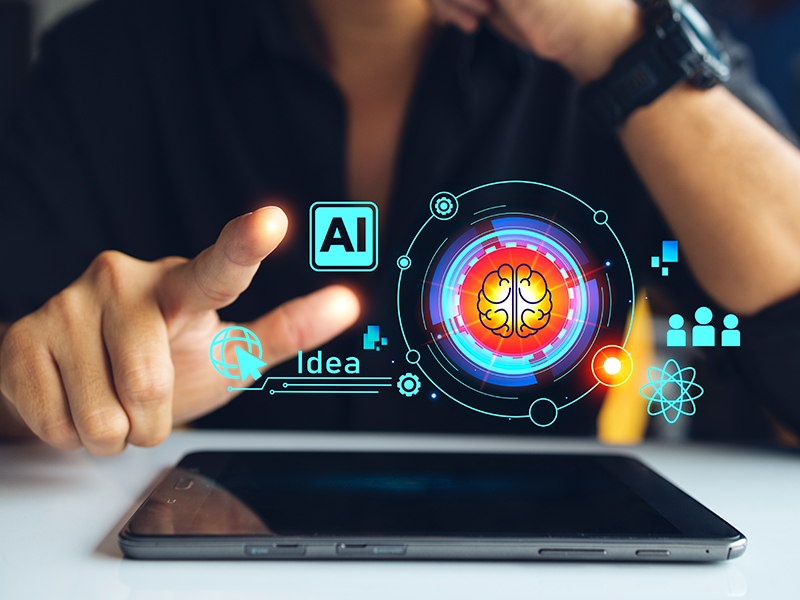How AI is Changing Digital Branding
In today’s fast-paced digital world, the fusion of Artificial Intelligence (AI) and digital branding is revolutionising how businesses engage with their audiences. From personalized customer experiences to automated content creation, AI is not just a trend—it’s becoming a fundamental part of branding strategies worldwide. Whether you’re a startup or a Fortune 500 company, understanding how AI is reshaping digital branding is crucial to staying competitive.
1. Personalization at Scale
One of the most significant advantages AI brings to digital branding is the ability to offer personalized experiences at scale. Traditional marketing methods relied on demographic data and broad segmentation. AI, on the other hand, leverages behavioral data, search patterns, purchase history, and more to craft highly personalised messages for each user.
For example, AI algorithms can recommend products to users based on their browsing behaviour or create dynamic website experiences that change depending on who is visiting. Brands like Amazon, Netflix, and Spotify are prime examples of companies using AI-driven personalization to deepen customer engagement and boost loyalty.
2. Smarter Customer Insights
Understanding your audience is the cornerstone of strong branding. AI tools can now analyze vast amounts of customer data in real time, giving marketers deeper and more accurate insights. AI can process feedback from various sources—social media, reviews, customer service interactions—and identify trends, sentiments, and pain points.
These insights help brands fine-tune their messaging, design better products, and address customer concerns faster. For example, sentiment analysis powered by AI can instantly detect if a campaign is being received positively or negatively and allow teams to adjust their approach accordingly.
3. AI-Powered Content Creation
Creating consistent, high-quality content is a major challenge for any brand. AI is transforming this space through tools that generate blog posts, product descriptions, email copy, and even video scripts. Tools like ChatGPT, Jasper, and Copy.ai are helping marketers speed up the content creation process while maintaining brand voice and relevance.
While AI-generated content still benefits from human oversight, it offers a great foundation for brainstorming ideas, drafting initial versions, and managing large-scale content requirements without compromising quality.
4. Visual Branding with AI
AI is also revolutionizing visual branding. From designing logos to generating on-brand social media posts, AI-powered design tools like Canva’s Magic Design, Looka, and Adobe’s Sensei help businesses create professional visual assets with ease.
These tools use machine learning to understand brand guidelines and generate visually cohesive content that maintains consistency across platforms. AI can even analyze which visual styles resonate most with specific demographics, helping brands fine-tune their aesthetic appeal.
5. Enhanced Customer Support with Chabot’s
Brand experience doesn’t stop at marketing—it continues through customer support. AI-driven chatbots are now capable of handling complex queries, providing instant responses, and offering 24/7 support. This improves the customer experience and strengthens brand reliability.
More importantly, AI Chabots can learn from each interaction, making future conversations smoother and more accurate. Integrating a well-trained AI chatbot can significantly reduce response times, improve customer satisfaction, and free up human teams for more nuanced support roles.
6. AI in Social Media Management
Social media is one of the most dynamic channels for digital branding, and AI is playing a crucial role in managing it effectively. From content scheduling and hashtag optimization to audience analysis and engagement prediction, AI tools like Buffer, Hootsuite, and Lately help brands maximise their social impact.
AI can also detect the best times to post, identify trending topics, and even analyze competitor performance, allowing marketers to stay ahead in the crowded social space.
7. Predictive Analytics for Better Strategy
AI’s predictive capabilities allow brands to forecast customer behaviour, sales trends, and market shifts. This gives marketers a powerful edge in planning and resource allocation. For example, predictive models can determine which campaigns are likely to succeed, how a product might perform in different regions, or when a customer is most likely to churn.
By incorporating predictive analytics into branding strategies, businesses can make proactive decisions rather than reactive ones, ensuring they’re always one step ahead.
8. Voice Search and Conversational AI
With the rise of smart speakers and voice assistants like Alexa, Siri, and Google Assistant, optimizing for voice search has become critical for digital branding. AI is driving this shift by enabling conversational interfaces that change how customers interact with brands.
Brands are now developing voice apps, integrating AI-driven voice technology into their customer service, and rethinking their SEO strategies to cater to natural language queries. Voice AI makes interactions more human and builds trust through convenience and ease of use.
9. Fraud Detection and Brand Safety
AI also plays a protective role in branding. With the digital space prone to ad fraud, fake reviews, and impersonations, AI tools can monitor and detect suspicious activities. They help ensure that your brand’s online presence remains authentic and secure.
By using AI-driven fraud detection systems, brands can safeguard their reputation, maintain customer trust, and ensure advertising budgets are not wasted on fraudulent clicks or views.
Conclusion
AI is not replacing the human touch in branding—it’s enhancing it. It allows marketers to focus on creativity and strategy while automating repetitive tasks and delivering insights that were once out of reach. The brands that embrace AI today are not just becoming more efficient—they’re becoming smarter, more adaptable, and more connected to their audiences. As AI continues to evolve, its role in digital branding will only grow stronger. The future belongs to brands that can harness its potential with empathy, ethics, and creativity.

